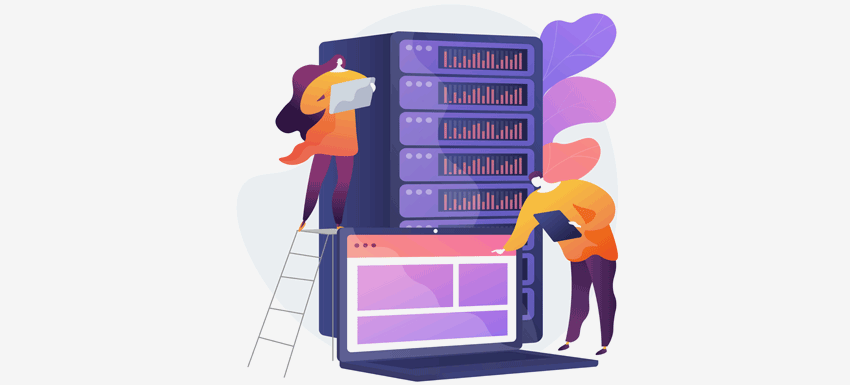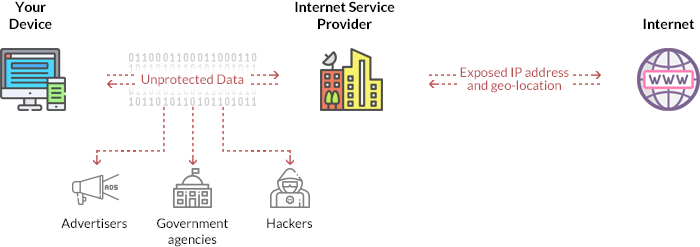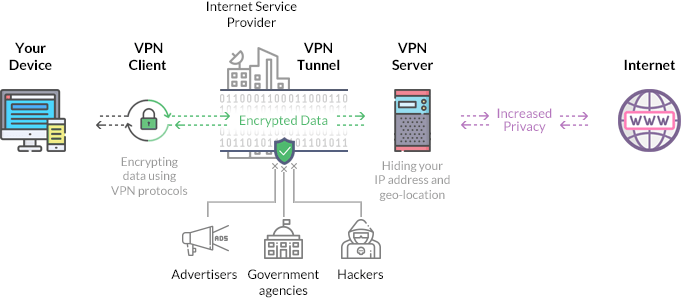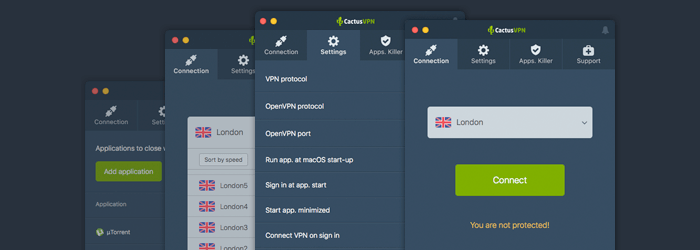What Is a VPN Server & How Does a VPN Server Work?

Table of contents
And in case you were also wondering what a VPN is or just wanted a quick refresher, we’ve got you covered with a short and simple definition.
What is VPN?
A VPN (Virtual Private Network) is a service that you can use when you connect to the Internet. It secures your online traffic and data, making sure you enjoy private browsing and unrestricted access to any online content you want.
Why Is a VPN Server Important?
Normally, when you want to connect to a website on the Internet, all your outgoing and incoming traffic and data will go through your ISP.
Since all your information is in a plain, readable format, your ISP (and anyone else for that matter – hackers, surveillance agencies, or advertisers) can see what you’re doing on the Internet.

What’s more, since your real IP address and geo-location are exposed to the web, pretty much anyone can use that information to find out various things about you – such as what country and city you live in, and who your ISP is.
Basically, without a VPN server, you’re like a sitting duck on the web – you’re exposed to serious privacy breaches alongside data and identity theft risks.
What Is a VPN Server?
A VPN server is a physical or virtual server that is configured to host and deliver VPN services to users worldwide. The server is a combination of VPN hardware and VPN software that allow VPN clients to connect to a secure private network. Unlike most servers, a VPN server usually has more logical and physical communications ports.
How Does a VPN Server Work?
The whole process starts with you running a VPN client. It connects you to the VPN server, and starts sending your traffic to it through your ISP. However, this time, all your data is encrypted by the VPN protocols the server is configured with, meaning your ISP (or anyone else) can’t monitor it.
Once the VPN server receives all the encrypted information, it will proceed to decrypt it, and forward it to the designated web server. Afterwards, the VPN server will encrypt the data it receives from said web server, and send it to you through your ISP. Once you receive that data on your device, the VPN client will decrypt it for you.
To get a better idea of how it all works, imagine there is a “tunnel” established between the VPN client and the VPN server. Any data going through that tunnel is encrypted, and – therefore – unreadable to anyone who is outside the tunnel.

Another thing the VPN server will do for you is hide your IP address and replace it with its own address. The server does that to help you hide your geo-location on the Internet, allowing you to enjoy even more privacy, and bypass annoying geo-restrictions and firewalls at the same time.
What Is VPN Server Software?
VPN server software is what allows a server to offer VPN services to users. It’s software developed by VPN protocol devs, and it’s installed on the server. Besides just handling client/server communications and network and hardware components, VPN server software configures servers with added security which allows them to encrypt and decrypt connection requests and incoming information.
VPN server software also uses VPN protocols to encrypt user data and traffic. Generally, more than one VPN protocol is used to offer users more control over their connections. These are the most commonly used VPN protocols:
How Does a VPN Server Improve Your Online Experience?
First of all, a VPN server encrypts all the data and traffic that’s heading to your device, essentially making sure that:
- Your ISP can’t see what you’re doing online, meaning there’s no chance of them throttling your bandwidth or sharing your data with the authorities or advertisers.
- You won’t fall victim to mass online surveillance, having your privacy threatened by the likes of the NSA or CIA.
- Your private data isn’t at risk of falling into the wrong hands. Essentially, cybercriminals won’t be able to exploit network weaknesses (yes, even on unsecured WiFi networks) to steal your credit card details, bank account information, and login credentials.
Besides that, a VPN server will hide your real IP address, ensuring no surveillance agency, hacker, advertiser, or website can see it and find out information associated with it (like your country, city, or even ISP).
Plus, having your IP address hidden means you can bypass annoying geo-restrictions that can prevent you from enjoying the online content you want. The same goes for firewall restrictions at work or school too.
Looking for a Great VPN Server?
We here at CactusVPN have got you covered – we offer a high-end VPN service that offers you access to 30+ high-speed servers from around the world that feature unlimited bandwidth and double as proxy servers too. Plus, 10 of our servers offer P2P support as well.
What’s more, our servers are equipped with 6 VPN protocols (including the highly-secure OpenVPN protocol) and AES encryption. On top of that, our servers also use shared IP tech, ensuring your online activities can’t be linked to you or your device(s).
Besides all that, our service features other extras, such as a Killswitch, cross-platform compatible apps, up to 5 simultaneous connections at the same time, and a Smart DNS service that can help you unblock 300+ worldwide websites (including Netflix US).

Special Deal! Get CactusVPN for $3.5/mo!
And once you do become a CactusVPN customer, we’ll still have your back with a 30-day money-back guarantee.
Conclusion
Connecting to the Internet without a VPN server can be pretty risky – your IP address is exposed (meaning a lot of personal information is exposed to), your ISP can see everything you do online (and so can other people – like hackers and surveillance agencies), and you might not be able to access all the content you want (because platforms using geo-blocks know what your IP is).
What is a VPN server, you ask? It’s either a physical server or a VPS (Virtual Private Server) through which a VPN provider offers you access to their VPN services. Any data exchanged between you and the server is encrypted, so nobody can monitor it, and the server also hides your real IP address.
Overall, a connection to the web through a VPN server is a much safer and private one.
“WireGuard” is a registered trademark of Jason A. Donenfeld.
Abstract vector created by vectorjuice – www.freepik.com
 Are VPNs Legal & Is Using a VPN Legal?
Are VPNs Legal & Is Using a VPN Legal?
 What Types of IP Addresses Do VPN Providers Normally Offer?
What Types of IP Addresses Do VPN Providers Normally Offer? 